This piece is part of a series on refugees in Turkey made possible by support from the Tent Partnership for Refugees. The views expressed are those of its authors and do not represent the views of Tent, their officers, or employees.
As World Refugee Day approaches on June 20, the number of refugees worldwide will likely surpass last year’s 25.4 million. That governments in the West and elsewhere—under pressure from anti-immigrant populists—are increasingly shutting their doors to refugees and asylum-seekers only exacerbates their plight.
Meanwhile, the international community aspires to do better. The 2018 Global Compact on Refugees (GCR) puts forward a wealth of policy ideas to improve protection for refugees and support for host countries. In many current political environments, the GCR’s broader recommendations may receive pushback; hence, concrete ideas for implementation will matter.
The place to start could be Turkey. Turkey hosts the largest number of refugees in the world and has had a burden-sharing agreement with the European Union since 2016, but the agreement needs to be revisited or restructured to encourage Syrians to achieve greater self-reliance. Recognizing the centrality of the migrant issue for Europe—and Turkey’s key role in stemming flows—the compact’s innovative ideas serve the interests of both sides, as well as of course refugees themselves and the broader international community.
Why the compact matters
More than a million Syrian and other nationals poured into Europe, mostly on foot, in 2015 and 2016. In response, at a United Nations Summit in September 2016 the New York Declaration for Refugees and Migrants called for the creation of a global compact on refugees.
The compact came to fruition last year, calling on U.N. members to develop long-term, sustainable solutions to large movements of refugees by helping to:
- Ease pressures on host countries,
- Enhance refugee self-reliance,
- Expand access to third-country solutions, and
- Support conditions in countries of origin for return in safety and dignity.
The GCR has elicited praise for once more reiterating that protecting refugees is a global responsibility and for advocating that more should be done to share the burden born by host countries. Yet it has been criticized as being designed to protect rich countries from unwanted refugees and leaving the burden on the developing world, which continues to host the overwhelming majority of the world’s refugees.
The rise of populism and anti-immigration politics in Europe and the United States make the prospects for expanding access to third-country solutions politically challenging, at least in the near term. Early in 2019, the United Nations High Commissioner (UNHCR) noted that “less than 5 percent of global refugee resettlement needs” were met last year. The persistence of violent conflicts in as diverse places as Afghanistan, Congo, Myanmar, Somalia, Syria, and Yemen make the resulting displacement crises ever more protracted. In many of these cases, the safe, dignified, and sustainable return of refugees to their homes will remain elusive.
This makes local solutions, rather than resettlement, the default outcome, and hence improving refugee self-reliance and easing pressure on host countries is paramount. Further strain on host countries will only jeopardize already scarce resources and fragile societal peace— overburdening them could provoke even more political backlash. The GCR calls for national and international stakeholders to “promote economic opportunities, decent work, job creation and entrepreneurship programs for host community members and refugees” to promote social cohesion and enable refugees to build productive and sustainable lives free from charity and precarity.
Enabling refugees’ access to host countries’ labor markets will not be easy. Most of the countries that host large numbers of refugees—like Turkey, Jordan, and Lebanon—have weak economies and high unemployment levels. This forces refugees to seek employment informally, increasing the exploitation and aggravation of refugees’ precarious situations. Resentment towards refugees grows, in particular among unskilled locals who see their wages and employment prospects being eroded.
This is an unsustainable situation for both the refugees and the host community. Yet studies have shown that migrants and refugees can contribute to the economic growth and the welfare of host countries if they are properly incorporated into those countries’ labor markets. For this to be achieved, refugees must be given a chance to participate in the formal economy and therefore pay taxes and contribute to social security funds. The letter and the spirit of the GCR can help to bring this about.
Applying the compact’s lessons to Turkey and Europe
Turkey hosts more than 3.6 million Syrian refugees and nearly 400,000 of other nationalities. Syrians have been under temporary protection since they first began to arrive in April 2011. This arrangement has enabled them to enjoy protection from forced return to Syria and access to basic public services including health care and, more recently, public schools.
The UNHCR and the EU, among others in the international community, praise Turkey for hosting such large number of refugees. According to government officials, Turkey has spent more than $37 billion for the refugees, supplemented by funds made available through the Facility for Refugees in Turkey (FRIT), adopted as part of the migration deal reached between Turkey and the EU in 2016 to stem the flow of Syrians into Europe. FRIT, via the Emergency Social Safety Net (ESSN), has provided more than 1.5 million recipients with a modest level of cash assistance to help families meet their basic needs since November 2016, and has supported various projects to improve refugees’ living conditions.
These efforts, however, have fallen well short of enabling refugees to maintain self-reliance. There are no reliable statistics, but the World Bank in 2018 reported that “at least half of the over two million working-age Syrians work informally,” with possibly 200,000 working as seasonal laborers in the agricultural sector, often in particularly difficult conditions. Informality makes them vulnerable to exploitation, especially women and children. Even after extensive efforts, including a Conditional Cash Transfer for Education program, almost 40% of Syrian and other refugee children remain out of school.
Although the Turkish government introduced legislation in 2016 to open its labor market to Syrian refugees, informal labor has persisted. Administrative hurdles and a fear among some Syrians that giving up their informal work status will actually cost them some competitive edge meant that fewer than 39,000 work permits were issued in 2018, a modest increase from 15,700 in 2017. International organizations such the UNHCR, United Nations Development Programme (UNDP), Food and Agricultural Organization (FAO), International Labor Organization (ILO), and International Organization for Migration (IOM) are still working to improve the skill set of refugees and enhance their employability. NGOs such as SGDD-ASAM, United Works and Spark have focused on placing refugees into formal jobs. The Turkish Employment Agency (ISKUR) is also collaborating with the UNDP to expand its labor market services to cover refugees.
Are these efforts having an impact? It is hard to know. Prospects for economic integration of refugees is complicated by:
- The fact that their educational level is significantly lower than locals;
- Slow economic growth, which contracted from 11.1% in 2011 when refugees first began to arrive to 2.6 % in 2018, and
- High unemployment in general in Turkey, with a rate of almost 15% —the highest in a decade.
The World Bank’s Global Economic Prospects report foresees negative growth for Turkey in 2019, worsening the picture for refugees. However, the GCR—with its emphasis on the importance of international community helping “to foster inclusive economic growth for host communities and refugees”—offers a framework to help the EU and Turkey to explore possibilities going beyond the FRIT.
Refugees, labor, and trade
One immediate idea originating from the GCR is exploring “preferential trade arrangements … especially for goods and sectors with high refugee participation in the labor force.”
The EU-Jordan Compact of 2016 allowed Jordanian industrial goods to enter the EU in return for a commitment from Jordan to extend work permits to Syrians refugees. This arrangement would benefit the host community by increasing exports, while improving the overall livelihood of both the host and refugee communities through economic growth. While the agreement has encountered challenges, both parties are so far sticking with it and seeking to learn from these challenges. Similar approaches are being adopted for Bangladesh and Ethiopia, too.
Such preferential trade agreements are particularly suited for Turkey because it already has a customs union with the EU, which has benefitted the Turkish economy and exports greatly since its inception.
Yet, the customs union has fallen behind the times, and both sides have agreed to modernize and upgrade beyond industrial goods, to include agricultural products, services, and public procurements sectors. Impact studies commissioned both by the EU and Turkey demonstrated that such an expansion would offer Turkey significant welfare gains. The poor state of relations between the EU and Turkey has kept both sides from starting negotiations. The impasse is likely to last, and in the interim both sides could pragmatically be addressing some key administrative issues. For instance, improving certain costly transport delays resulting from cumbersome administrative border procedures could enhance opportunities for companies exporting perishable agricultural products; Syrian refugees, in turn, could be employed in Turkey’s agricultural sector, which suffers from a shortage of skilled labor amid falling enrollments in agricultural and veterinary studies. Turkey and the EU could institute scholarship programs for Turkish and the growing number of Syrian youths graduating from Turkish universities to take up advanced studies and apprenticeship opportunities in EU institutions before returning to Turkey. Such a program could be accompanied by commitments from major Turkish agrobusiness companies to offer them long-term careers. This program would enhance employment prospects for Syrians and help prepare the human capital that Turkey will need when the customs union is finally modernized.
Everybody wins?
Each protracted refugee situation has its own particularities, and what may work for the Turkish case may not be applicable elsewhere. However, as a general rule, it is important to explore and encourage policies that can enhance the self-reliance of refugees and resilience of host communities.
Moving forward, both the EU and Turkey have a stake in giving life to the GCR and ensuring that refugees are employed formally and offered decent work. Turkey needs to adopt ideas from the letter and spirit of the GCR, because incorporating close to 4 million refugees into Turkish economy and society while maintaining social peace won’t be easy. Turkey cannot accomplish this on its own, especially at a time when its economy is increasingly troubled.
The EU is Turkey’s most obvious partner. Europe has a stake in sharing responsibility with Turkey—not just because Turkey is already an important economic partner, but because it is central to European stability, something the 2015 migration crisis made clear. Such cooperation would be a win for the EU, for Turkey, and most importantly, for the refugees and their host communities, who have not exhibited the xenophobia and anti-refugee sentiment visible in Europe. And more broadly, these early efforts to operationalize the GCR would demonstrate to the international community that burden-sharing in protecting refugees is indeed possible.
The Brookings Institution is committed to quality, independence, and impact.
We are supported by a diverse array of funders. In line with our values and policies, each Brookings publication represents the sole views of its author(s).

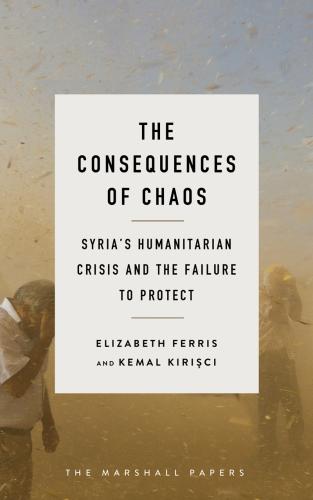
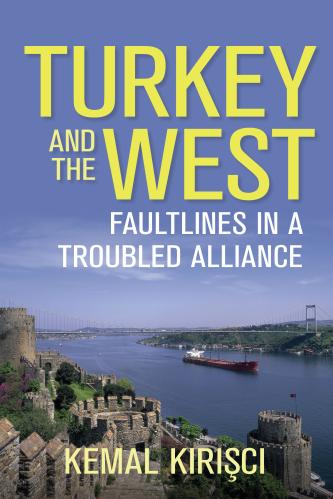

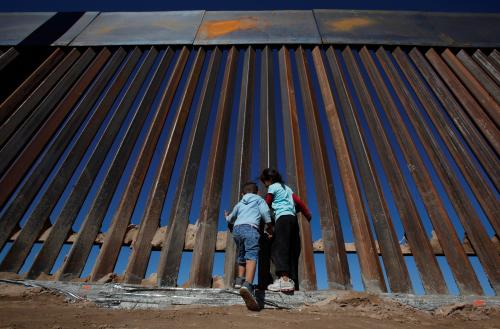
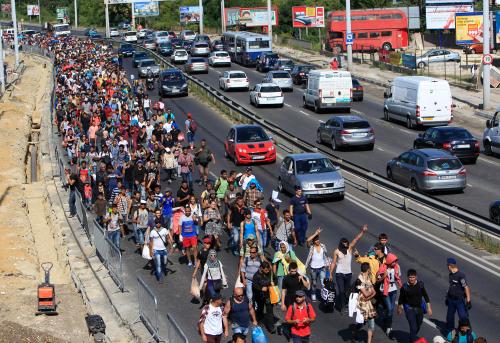


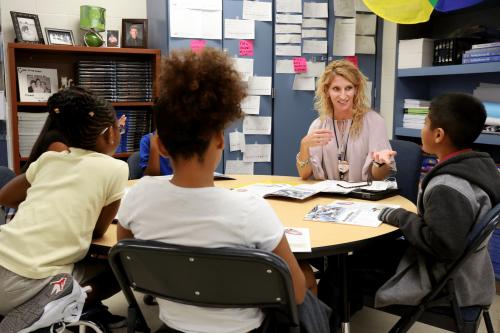

Commentary
How to make concrete progress on the Global Compact on Refugees
Starting with Turkey and the EU
June 7, 2019